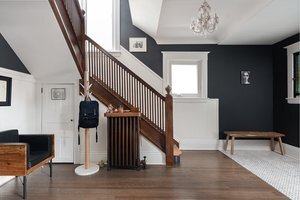
Choosing the right home intercom system is essential to maintaining the safety and convenience of both residential and commercial spaces in a time when communication and security are of the utmost importance. From basic audio communication devices to complex integrated systems featuring seamless communication functions, video surveillance, and access management, intercom systems have seen substantial evolution. This extensive manual examines critical elements to take into account, the range of intercom system options, and practical installation and integration advice.
Understanding Intercom Systems: Their Functions and What They Are
An intercom system facilitates interaction among individuals who are dispersed within a building or property. In the past, voice communication—which allowed users to speak and listen through connected devices scattered across a building—was the main purpose of intercoms. On the other hand, cutting-edge capabilities like video surveillance, remote access control, and connection with smart home technology are increasingly standard on current intercom systems.
Home Intercom systems typically consist of several key components:
- Master Station: The central control unit of the intercom system, usually located in a central area of the building. It allows users to initiate calls, monitor video feeds (if applicable), and control system settings.
- Substations or Room Stations: These are individual units installed in specific rooms or locations, allowing occupants to receive incoming calls, communicate with the master station, and grant access if integrated with access control systems.
- Outdoor Stations: Mounted near entry points such as gates or doors, outdoor stations enable visitors to communicate with occupants inside and request entry through audio or video channels.
Benefits of Installing a House Intercom System
Enhanced Security: One of the primary reasons for installing a house intercom system is to enhance security. By providing real-time communication and video monitoring capabilities, intercom systems allow occupants to verify visitors before granting access, reducing the risk of unauthorised entry.
- Convenience and Accessibility: The installation of intercom systems in large residences or buildings makes communication more convenient by removing the need for shouting or long walks to convey messages. Additionally, they make remote communication possible, letting homeowners talk to guests or service providers from any location on the property.
- Integration with Access Control: Modern intercom systems can be integrated with access control systems, enabling users to remotely unlock doors or gates after verifying the identity of visitors. This feature enhances convenience while maintaining security protocols.
- Emergency Communication: In the event of emergencies such as fires or medical incidents, intercom systems enable quick communication with emergency services or other occupants, facilitating prompt response and assistance.
- Monitoring and Surveillance: Intercom systems with video monitoring capabilities provide added surveillance, allowing homeowners to monitor entry points, deter potential intruders, and record activities for security purposes.
Types of Intercom Systems
Intercom systems are available in various types, each catering to different needs and preferences:
- Wired Intercom Systems: These systems rely on physical wiring, usually low voltage, for the connection between the master station, substations, and outdoor station. Wired intercoms are highly rated for their dependability and performance; however, they cannot be easily installed by a layman as they rely on wiring tracks.
- Wireless Intercom Systems: These include the use of wireless technology to cover the distance between the two units by Wi-Fi or radio frequency transmission, giving flexibility of installation, and can be added or relocated easily in a property. They are perfect for applications in buildings that are not new and do not require a lot of rewiring.
- Video Intercom Systems: Video intercoms use audio signaling and, at the same time, include video surveillance facilities. It enables the users to capture and interact with the visitors through a video stream as added security, as the visitor’s identity is checked and verified visually before being allowed in.
- IP Intercom Systems: Internet Protocol (IP) intercom systems integrate the use of networks to relay messages in the form of audio and video via the internet or a local area network. They provide flexibility, the option of control via the Internet or other services, and compatibility with other Smart House devices or security systems.
- Integrated Systems: Some brands include access control and surveillance cameras and can be connected to home automation systems, making them a security solution, an intercom system, and a means of communication.
Factors to Consider When Choosing an Intercom System
When selecting a home intercom system for enhanced security, consider the following factors to ensure compatibility with your needs and environment: When selecting a home intercom system for enhanced security, consider the following factors to ensure compatibility with your needs and environment.
- Security Requirements: Determine its security requirements by identifying how big the property is, how many doors are there, and how much access should be restricted. There are several options that should be considered while choosing an intercom system, which could include video monitoring, remote unlocking, compatibility with the existing security systems, and others.
- Installation Environment: Decide whether a wired or wireless intercom system is best for your property. Such options include the construction and design of the building, the materials used in construction, and the possibility of making conduits for wiring.
- Scalability and Expansion: Select a system that you may perhaps extend in the future, for example, by adding more substations, incorporating smart automation, or extending its coverage to the compound’s outside area.
- User Interface and Accessibility: Think about the usability and convenience of the intercom system’s interface. Avoid gadgets that have complex controls, poor sound quality, or other confusing features when it comes to communication.
- Integration with Other Systems: Check whether the selected intercom will be compatible with other existing security systems, smart home devices, or home automation systems one has in their home.
- Power Supply and Backup: Check for the appropriate wattage and intensity of the intercom system, and look for ways of providing a contingency power source with battery backups or UPS to offer uninterrupted use in case of blackouts.
Installation and Maintenance Tips
Once you have selected the right house intercom system for your security needs, follow these tips for installation and maintenance:
- Professional Installation: For wired intercom systems or complex installations, enlist the services of professional installers with experience in intercom systems and security solutions.
- Positioning: Place master stations, substations, and outdoor stations strategically to optimize communication coverage and minimize signal interference.
- Regular Maintenance: Schedule regular inspections and maintenance checks to ensure proper functioning of the intercom system, including cleaning components, testing audio/video quality, and updating software/firmware as needed.
- User Training: Provide training to occupants on how to operate the intercom system effectively, including making calls, adjusting settings, and responding to visitor requests.
Practical Applications of Home Intercom Systems
Home intercom systems offer versatile applications that extend beyond security. Home intercom systems offer versatile applications that extend beyond security.
- Family Communication: Help in communication between the members of the family in different zones of the house, for example, when calling for food or setting the working timetable.
- Remote Access Control: Lend the guests, delivery, or any personnel easily with a single touch through your phone or a master station.
- Monitoring Children or Elderly: Superior vena cava is useful for watching children at play in the yard or for elderly grandparents who may need some help now and then.
- Home Automation Integration: Personal: It should allow the ability to control lights, thermostats, and other appliances within the home utilizing voice commands or remotely.
Trends in Intercom System Design and Development
As technology continues to advance, future trends in home intercom systems may include:As technology continues to advance, future trends in home intercom systems may include:
- Artificial Intelligence (AI) Integration: intelligent intercoms that go beyond the basic communication method, providing facial recognition, voice recognition, and other security and convenience analysis features.
- Cloud-Based Solutions: Web-based intercoms where data, including voice and video data, is stored on the cloud and can therefore be remotely streamed and/or monitored in real-time and analyzed.
- Enhanced Connectivity: Connectivity with 5G networks and items of IoT (Internet of Things) for quicker information transfer rates, better connectivity, and compatibility with other smart items in people’s homes.
- Energy Efficiency: Intercom systems that incorporate energy-efficient parts and features that, in the long run, minimize the effects on the environment and operating expenses.
Conclusion
To summarise, choosing a proper house intercom system or home intercom is crucial in order to have reliable security, communication, and convenience in living and working spaces. By reviewing the advantages of using an intercom system, assessing its various types depending on security concerns and installation aspects, and determining future trends in technology, homeowners and property managers will be in a position to make informed decisions in line with their needs.
In cases where you require better security on who is allowed entry, surveillance of your premises, or even better flow of information, an effectively chosen intercom system is highly recommended. Employ an effective and durable intercom system, endeavor to follow proper installation and maintenance procedures, and be open to the new trends in security and communication systems in the home or commercial buildings.
To acquire personalised recommendations on Home Intercom system options and installation that will best suit your security requirements, it is advisable to seek recommendations from security solution providers or hire certified Home Intercom installation specialists who focus on intercom systems and security service solutions. Always be on the lookout for the best intercom systems that will improve the standard of security and communication and even give you the necessary serenity for your property in the contemporary world.
(https://emperiortech.com/)











